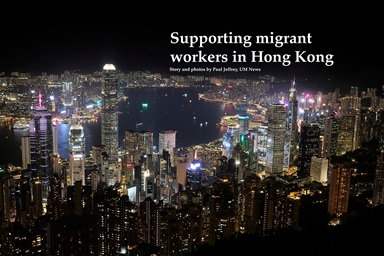Ana Mendoza, 19, is about 100 miles from the country of her birth but it is an abyss she cannot cross.
As a recipient under the Deferred Action for Childhood Arrivals program, she is protected from deportation, at least for now. But she is not free to leave the U.S. That means she can only see her family in Mexico via FaceTime.
As a student intern at the Frontera Wesley in Tucson, Arizona, Mendoza is bringing her insight and experience as an immigrant to a Lenten devotion, “40 Days in the Desert: Resisting Temptation in the Borderlands.” Frontera Wesley is a campus ministry that serves students at the University of Arizona and Pima Community College.
Referring to the temptations Jesus experienced during his 40 days in the desert, Mendoza is using real-life examples of immigrants who are struggling daily to cross borders for a better life in the United States. She is also tackling misconceptions people have about immigrants and is encouraging people to become allies instead of enemies.
Here are some examples from the devotion:
- Day 3. A woman talks about crossing the border in January 2009. She suffered from hunger, thirst, extreme cold and constant fear. “Everything I did was for my children. I couldn’t stand not seeing them for another day. I missed them so much, they were all I thought of even though I knew they were okay.”
- Day 8. A student talks about “being brown and living in a border town.” The student speaks anonymously about racial profiling as a normal course of life even for a U.S. citizen. “I have never felt protected by the border patrol’s constant presence, instead I was always fearful of being arrested or killed by an agent on any given day.”
- Day 24. Another student talks about the emotional tolls of seeing border patrol cars around the city of Tucson. “Every time I drive near a border patrol car I tend to tense up, hold my breath and pray that at the next light they will make a turn. In these moments, my life always tends to flash before my eyes and my security along with my parents’ security is in question. Being 100 miles away from the border signifies that border patrol and their hunt for human lives lurks around our streets."
Passing checkpoints and racial profiling is common for the students who attend the University of Arizona and Pima Community College, said the Rev. Hannah Adair Bonner, Frontera Wesley director.
“When I moved from Texas to Arizona, I knew so little about what life is really like here,” she said. “We have to go through checkpoints just to go south of Tucson — we are still in the U.S. but we have to go through checkpoints even to visit friends.”
As she was dreaming of her new job, Bonner had thought she would be leading students across the border frequently to be in mission and ministry with migrants. She soon realized most of her students are not free to cross the border.
“I cannot take my students to the border. I had conceived my whole ministry around that, to realize this is not even possible was piercing for me because the only students who feel comfortable going to the border are my white students,” she said.
Mendoza was born in Mexico but came to the United States with her family when she was 3 years old.
Her mother had a law degree, and her father owned a ranch. But the opportunities for making a living were not as good as in the U.S., and they knew their children would be able to attend better schools. They sold everything they owned and got four visas to live in Arizona.
In the years before her family’s visa expired in 2010, she would go back to Mexico to stay with family during the summer.
But she said even during that time, as she crossed back and forth from Mexico to the U.S., she was cautioned not to speak English if questioned by the border police.
“I had to memorize the alphabet in Spanish, and I had to know the name of the school I would attend if living in Mexico and the name of my teacher,” she said. “My parents would always get nervous and they would start praying.”
Both Mendoza and her brother, 18, are DACA recipients. Her parents, however, are undocumented.
“DACA has provided some relief. I can drive. I can work,” she said. But it is a part of her daily routine to read the news to keep up with what President Donald Trump’s administration is doing or saying about DACA and undocumented people living in the U.S.
For now, two federal courts have put the Trump Administration’s rescinding of the program on hold. Under court orders, the U.S. Citizenship and Immigration Services must continue accepting DACA applications from individuals who have previously been part of the program.
“It is an emotional stress,” Mendoza said. “You are in constant limbo.”
Faith sustains her and her family, she said.
She remembers when her family was pulled over by police once and border police were called.
“Our first instinct could have been to start crying or panicking, but we pulled out the Bible and started reading Psalm 91 and praying,” she said. “From that day to this, we are still here. My faith reassures me and provides my family strength we couldn’t find without it.”
Mendoza is studying political science, minoring in Spanish and English. She wants to pursue a law degree in human relations and human rights.
She wants people to listen and learn.
“The voice that should be heard is the person directly impacted.”
Gilbert is a multimedia reporter for United Methodist News Service. Contact her at 615-742-5470 or [email protected]. To read more United Methodist news, subscribe to the free Daily or Weekly Digests.
Like what you're reading? Support the ministry of UM News! Your support ensures the latest denominational news, dynamic stories and informative articles will continue to connect our global community. Make a tax-deductible donation at ResourceUMC.org/GiveUMCom.




